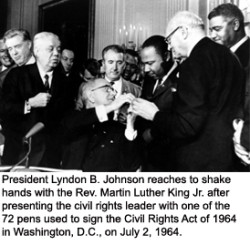
I knew nothing of politics, racism, sexism or discrimination. I was a 4-year-old girl whose life had been up-ended. I couldn’t know it then, but the events surrounding the passage of the 1964 Civil Rights Act 50 years ago today would have an enormous effect on my life and future.
There are those just a decade or so older than me who describe themselves as “children of the ’60s.” For me, this was literally true. I was a child in the ’60s, and while I know the nation was roiled by war, resistance, race-consciousness, and a burgeoning feminism, most of this was beyond me. My parents were very conventional—even square, by the nomenclature of the time. So it was not until I was in my early teens, with the help of a decidedly counter-cultural “current events” history teacher in my Utah public junior high school, that I began to see what I had been missing. My life would never be the same.
The Freedom Riders, Malcolm X, Rev. Dr. Martin Luther King, Fannie Lou Hamer, and Stokley Carmichael were some of names I came to equate with living beyond oneself. I began to understand race privilege, white supremacy, Jim Crow, and the repellant history of our nation in its treatment of blacks and other communities of color in a way that would mark me forever.
I know this nation is far from living the ideals embraced or the vision imagined during the Freedom Summer. I know the values expressed in the 1964 Civil Rights Act remain, in many ways, illusory and unfulfilled. But I am not the only young white kid moved to live differently in the world by a school teacher who awakened my belief that I could make a difference.
What we mark and honor this week was made possible by the grit, genius, and ultimate sacrifice of countless African-Americans, known and unknown. And the commitment of many others who believed we could and must do better. We are now better off for all those efforts, but we are far from the promise of full racial justice, equality, and dignity. As we mark this landmark anniversary and understand how much better we all are to live in a nation where full equality is the ideal, our commitment must be to fulfill that promise.









